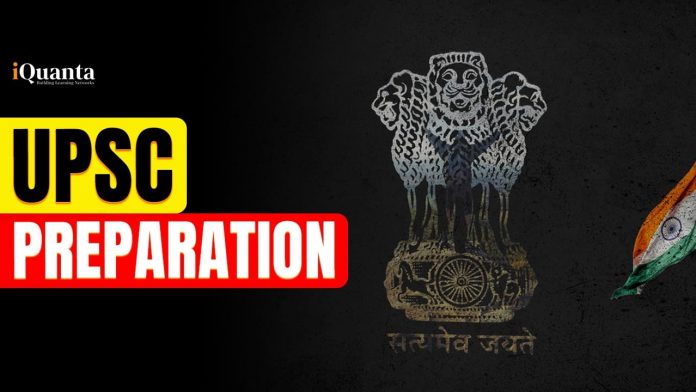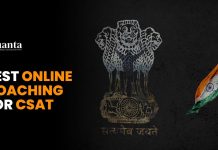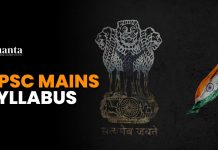In this article we will delve deeper into the UPSC Preparation tips and mistakes that most candidates to that can be avoided to ace the examination.

UPSC Preparation Tips To Remember
- Learn About The Exam: The most important step towards preparing for any exam is getting to know about the exam. What are the key areas it accesses, topics and sub-topics which need to be practiced, exam pattern and eligibility.
- Make A Time Table: Becoming a civil servant requires adopting the disciplined habits of an organized professional. A well-structured timetable not only streamlines your preparation process but also helps in meeting deadlines and completing the syllabus efficiently. It’s crucial to analyze the subjects included in the UPSC syllabus, identifying your strengths and weaknesses, to tailor your study plan accordingly.
- Stay Disciplined Not Motivated: One thing that’s extremely crucial to determine your performance is how disciplined you are in your preparation stage. Motivation doesn’t last longer, it fades away with time, but discipline goes a long way in shaping your transformative journey.
- Know The Syllabus: It’s vital to know the complete syllabus thoroughly to be able to anticipate what kind of questions one might face in the examination. To understand the detailed syllabus, click on UPSC Prelims Syllabus and UPSC Mains Syllabus.
- Stay Updated With The Current Affairs: For UPSC Preparation, it is extremely important to stay updated with the current affairs of the nation and the rest of the world as well. The candidates must go an extra mile to stay updated with the news.
- Read Newspaper Daily: Imbibe in yourself the habit of reading newspaper as it will not only act as a medium of staying updated with the things happening around the world but also will help you in improving your reading and comprehension skills.
- Make Notes: Creating concise notes during UPSC preparation proves beneficial for several reasons. Given the extensive nature of the UPSC syllabus, maintaining short notes helps in monitoring the covered portions and serves as a convenient tool for quick revision. Keeping separate files or notebooks for different subjects is recommended. This method streamlines the study process and enhances retention of crucial information during exam preparation.
- Choice Of Optional: The optional subject holds significant weight in the UPSC final score, accounting for 500 marks. Therefore, it is important to make a well-considered decision when selecting an optional subject. It’s advisable to carefully evaluate the advantages and disadvantages of the subjects you have in mind before making your choice. This thoughtful approach ensures that you make the most suitable selection, maximizing your chances of success in the examination.
- Written Practice: The UPSC Mains examination papers are majorly descriptive. Candidates are required to think with conceptual clarity and express their views, perceptions, and thoughts in a coherent manner. Additionally, they must take care of time and space constraints within the answer booklet.
- Thorough Revision: Revision holds immense importance, particularly when preparing for UPSC. It’s common to forget previously studied material therefore regular and timely revisions are extremely important to remember everything. By revisiting topics periodically, candidates reinforce their understanding and retention of key concepts.
- Right Attitude: Another thing on which your future depends is right attitude of dealing with things. Keeping calm and cool headed with a positive attitude can accelerate your preparation to next level.
Also Read: UPSC Notification 2024

Mistakes To Avoid
- Taking The Qualifying Exams Lightly: It’s very important to note that most applicants have a light attitude towards the qualifying exam of UPSC Prelims also known as CSAT or General Studies Paper II. CSAT has a vast syllabus and all the candidates have to clear the minimum cut-off to be eligible for UPSC Mains examination. It is advised to take mock tests for CSAT to be able to anticipate the level of difficulty and question types asked on the exam.
- Wishful Thinking: Wishful thinking is something where we are in our fairyland thinking about how things will turn out if everything happened as per our will. Most candidates are caught in this trap, rather than putting in efforts to improve and then eventually become a lot better, they dream about cracking the exam and be a part of the esteemed civil services. That doesn’t happen! So it is important to burst the bubble and get real with the preparation.
- Taking Too Much Pressure: Another thing which most people acknowledge but fail to understand. Putting yourself under pressure is no way of dealing with an examination which has an exceptionally low success rate. Deciding to pursue IAS is in itself a great deal. It is advisable to stay positive and DISCIPLINED rather than being under pressure.
How to Prepare for UPSC ( Subject-Wise)
UPSC Preparation for Indian Polity
- Begin with NCERT Books: Commence your Indian Polity preparation by utilizing NCERT textbooks. Start with “Indian Constitution at Work” (Class 11) and “Political Theory” (Class 11).
- Study Indian Constitution: Dive deeply into the Indian Constitution, the bedrock of Indian Polity. Grasp its articles, schedules, and amendments meticulously. Create comprehensive notes highlighting key provisions. Stay updated with current political developments nationally and globally.
- Learn Fundamental Concepts: Focus on understanding fundamental concepts like federalism, separation of powers, fundamental rights, and directive principles. Pay special attention to areas such as the parliamentary system, elections, and governance.
- Solve Previous Years’ Papers: Enhance your preparation by solving previous years’ UPSC question papers. This will familiarize you with question patterns and difficulty levels, facilitating better readiness.
UPSC Preparation for History
- Understand the UPSC Syllabus: Begin by thoroughly understanding the UPSC syllabus for the history optional subject to chart your preparation effectively.
- Utilize NCERT Books: Establish a strong foundation using NCERT textbooks for history from classes 6 to 12. These resources cover essential historical concepts comprehensively.
- Take Effective Notes: Make concise and organized notes while studying. This aids in quick revisions and enhances retention of crucial information.
- Analyze Previous Year Question Papers: Gain insights into the pattern and types of questions asked in UPSC exams by analyzing previous years’ question papers. This helps refine your preparation strategy.
UPSC Preparation for Geography
- Start with NCERT Textbooks: Lay the groundwork with NCERT geography textbooks. Begin with “Fundamentals of Physical Geography” (Class 11) and “India – Physical Environment” (Class 11) for basic concepts. Progress to advanced topics with “India – People and Economy” (Class 12) and “Fundamentals of Human Geography” (Class 12).
- Enhance Map Reading Skills: Utilize atlas books like the “Oxford School Atlas” or “Atlas of the World” to improve map reading skills. Understand concepts such as latitude, longitude, and various map types.
- Focus on Core Concepts: Grasp fundamental geographical concepts such as climate, landforms, population, urbanization, and regional geography. Utilize diagrams, charts, and maps for better understanding.
- Practice Map-based Questions: Regularly practice map-based questions to excel in the Prelims examination.
- Solve Previous Year Question Papers: Analyze previous years’ UPSC question papers to familiarize yourself with question patterns and levels of difficulty, aiding in better preparation.
UPSC Preparation for Economics
- Understand the UPSC Economics Syllabus: Thoroughly understand the economics syllabus outlined by UPSC for both Prelims and Mains to guide your preparation.
- Start with NCERT Books: Lay a strong foundation using NCERT textbooks for economics. Begin with “Indian Economic Development” (Class 11) and “Macroeconomics” (Class 12).
- Stay Updated with Current Economic Issues: Stay informed about current economic issues in India and globally by regularly reading newspapers like The Hindu, The Indian Express, and Business Standard.
- Analyze Economic Survey and Union Budget: Analyze the Economic Survey and the Union Budget of India for crucial insights into key economic indicators, policies, and initiatives.
- Refer to Economic Journals and Magazines: Supplement your knowledge by reading economic journals like the Economic and Political Weekly (EPW) and magazines like Yojana.
- Emphasize Current Affairs: Stay updated with recent developments and practice writing to develop a comprehensive understanding of economic concepts for the CSE.
UPSC Preparation for Environment And Ecology
- Stay Updated with Current Environmental Developments: Regularly read newspapers, magazines, and online sources to stay abreast of environmental policies, conservation efforts, and international agreements.
- Subscribe to Environmental Magazines: Consider subscribing to magazines like “Down To Earth” and “Environment and Ecology” for comprehensive coverage of environmental issues and solutions.
- Study Major Environmental Laws and Policies: Familiarize yourself with significant environmental laws and policies in India, including the Wildlife Protection Act and the National Action Plan on Climate Change.
- Understand India’s Biodiversity: Gain knowledge about India’s biodiversity, wildlife conservation efforts, and the significance of national parks and wildlife sanctuaries.
- Learn About Climate Change: Understand climate change and India’s initiatives to combat it, including commitments under international agreements like the Paris Agreement.
- Environmental Impact Assessment (EIA): Understand the EIA process and its significance in environmental governance.
- Connect Environmental Issues with Other Subjects: Recognize the interconnectedness of environment and ecology with subjects like economics, governance, and public health.
UPSC Preparation for Art And Culture
- Study Historical Background and Evolution: Explore the historical background and evolution of Indian art and culture, considering contributions from different dynasties and empires.
- Explore Various Art Forms: Learn about diverse Indian art forms, including classical and folk forms, as well as classical dance and music forms.
- Familiarize with Artists and Personalities: Get acquainted with renowned artists, musicians, dancers, and their contributions to Indian art and culture.
- Understand Architectural Styles: Study architectural styles exhibited in historical monuments and temples across India.
- Discover Cultural Practices and Festivals: Explore cultural practices, traditions, and festivals prevalent in different regions of India.
- Connect Art and Culture with Current Affairs: Relate your knowledge of art and culture to current affairs topics, especially concerning the preservation of cultural heritage and government initiatives.
UPSC Preparation for Science And Technology
- Stay Updated with Current Developments: Remain informed about the latest developments in science and technology by regularly reading newspapers and online sources.
- Explore Reputable Websites: Utilize reputable websites such as the Department of Science and Technology and ISRO for official information and updates.
- Study Major Scientific Institutions: Understand the contributions of major scientific institutions and research organizations in India.
- Address Ethical and Social Issues: Be prepared to discuss ethical and social issues related to science and technology in essays and answers.
- Connect with Other Subjects: Recognize the interplay between science and technology with other subjects like environment, governance, and economics. Understand their impact on society and governance.
Join iQuanta’s dedicated UPSC Facebook group to get latest updates, daily quiz and be a part of the winning clan.





